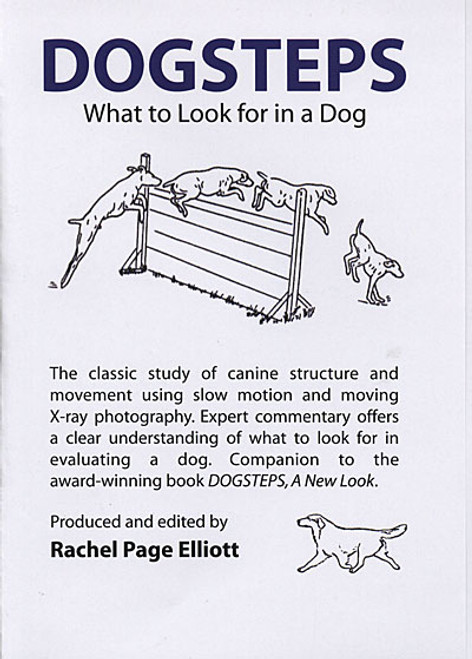The definitive manual on canine movement!
- Easy-to-understand text uses simple, straightforward wording aimed at the layperson
- Clear diagrams and illustrations provide an analytical look at the canine gait
- Dog anatomy and how each body part contributes to correct movement
- Angulation, toplines, tails, and front and shoulder assemblies in detail
- Natural gaits including walk, amble, pace, trot, hackney gait, suspension, canter, and gallop
There is always a need for understandable information on how dogs move and how their conformation affects movement. Legendary breeder and world authority on canine movement Rachel Page Elliott has recognized this need and, through her expanded research, has produced this third edition of her popular book, Dogsteps, containing the most up-to-date scientific information.
For decades, dog show judges and breeders around the world have relied upon this straightforward text and its cineradiographic illustrations to gain a more complete understanding of canine gait. Upon its publication in 1973, the Dog Writers Association of America bestowed upon Dogsteps its highest award, "Best Book of the Year." Even with the passing of its famous author in 2009, no other volume has stepped in the path of Dogsteps!
More than an analytical look at the canine gait, this 144-page guide teaches the details of dog anatomy and how each body part contributes to correct movement. In the show ring, judges evaluate a dog's movement to determine whether the dog is correctly structured. Dogsteps explains what the judge is looking for in layman's terms, making this book essential for breeders, judges, exhibitors, and students of purebred dogs.
This informative resource begins by explaining the terminology often used in descriptions of dog anatomy (stop, occiput, withers, hock, croup, etc.) and showing three comparative skeletons (dog, horse, and human), pointing out the critical similarities and differences. The author describes the eight natural gaits of dogs and how each is accomplished in specific breeds: walk, amble, pace, trot, hackney gait, suspension, canter, and gallop. Real science is applied, and myths are busted (such as the myth of the 45 degree shoulder), to help even a novice understand the biomechanics of walking in dogs.
Individual chapters are devoted to the topics of angulation, toplines and tails, front assemblies, and shoulder assemblies. Each chapter is illustrated with helpful drawings that act as "moving x-rays" to give you a clearer picture of how each anatomical region affects the dog's gait, pointing out common flaws, the importance of correct structure, and how balance and ease of movement are achieved in a properly put-together dog.
Providing dog breeders with a manual for breeding sound dogs, Rachel Page Elliott makes a case for correct structure as the most important aspect of keeping a breeder's line going strong. Recognizing faults in movement and structure, while not the primary intent of the book, allows you to be more aware of the many structural pitfalls that threaten the quality of purebred dogs today. Beyond having a great breeder as a mentor, Dogsteps is the single best source for learning all there is to know about canine anatomy, structure, and movement.
With its clear, simple wording and easy-to-understand drawings, study of this material will help you recognize what is good and what is faulty action. The application of what is learned should produce rewarding results for the conscientious dog breeder.
Perfect for anyone wanting to show dogs, explore canine massage or sports therapy, 4-H groups, and anyone who wants to brush up on canine movement knowledge, Dogsteps is with you every step of the way!











